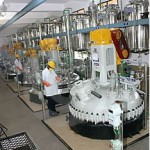 |
With the drug industry facing a drought of new drugs in the pipeline, lower revenues, lower margins and increased oversight, the times when the opposite situation made manufacturing efficiency and competitiveness uninteresting are over. |
Although research and development (R&D) is usually thought of as being the highest associated cost for pharmaceutical and biopharmaceutical companies, by industry estimates it is manufacturing that takes the cake with 36% of the cost, which is about twice that of R&D. The potential savings in manufacturing have been very large in absolute terms for many years. But high margins and revenues, along with the regulators’ old end process testing route for checking processes for compliance made companies reticent about change. Once a process was verified as compliant, any proposed change posed a possible stop in production and lost revenues that could not be sufficiently justified even with the manufacturing efficiencies gained. The move of regulatory agencies toward favoring compliance through built-in quality rather than end process testing has changed that. The rougher industry realities have also pushed companies toward going after the savings, wherever they may be.
One favored way to find such savings has been lean analysis. The lean analysis techniques and methodologies focus on the elimination of waste in every resource and making every process a value-adding one. This is precisely what a pharmaceutical consultant can do.
First, processes need to be defined as value-adding or non-value-adding. An investigation is then conducted to find out why it does not add value and whether it can be modified or substituted to add value. In this way, process by process, a streamlining of the manufacturing flow takes place, and control systems to ensure efficiency are installed.
Typical benefits of lean analysis are:
- Manufacturing cycle time reduction
- Lead time reduction
- Floor space requirement reduction
- Work-in-process reduction
- First-pass yields increase
- Throughput increase
- Productivity increase
In the pharmaceutical and biopharmaceutical environment, where the risk of contamination or product recall must be eliminated or face extremely high costs and liabilities, an added benefit of lean analysis is the elimination of information waste. Information systems are of great importance in building quality systems and ensuring compliance.



